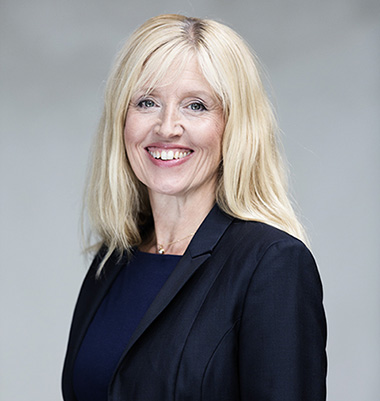Mere chance decides where you end up

- I remember the dungarees in Berzelii Park and how well I was taken care of by my supervisor.
The first day at KTH and the year was 1978. Gunilla Fransson was admitted to the Degree Programme in Chemical Engineering. Gunilla nurtured a dream to teach and planned to apply for teacher training, but she was advised to study to become an engineer instead.
- Like everything in life, mere chance decides where you end up and I found maths and logical subjects easy.
If computer technology had existed in the 1970s she would have studied it, but she applied to chemical engineering where there were other girls. She participated in student life and was a part of the student burlesque.
Gunilla Fransson made so many friends at KTH that she stayed there and researched nuclear chemistry. A small department which was an opportunity for her to realise her teaching dream. One day she saw an advertisement by Ericsson which was an invitation for their Open house. They were searching for teachers who were engineers.
Gunilla went to Ericsson's premises in Liljeholmen and their offer was attractive. Here she could combine natural science with business practice.
- Ericsson are good at training engineers and they invest in in-service training. In the company there is a culture of encouraging rotation between departments and experiencing new areas.
She moved to Australia and worked there for a few years in the mid-1990s. Back in Stockholm she was offered the opportunity to become a manager.
- I had no clear ambition of becoming a manager but I was results-driven and was offered the role of manager of the entire product area.
Gunilla Fransson claims that the key to the career ladder was her postgraduate studies.
- It is useful to get your licentiate. You learn to become independent and deliver results while you structure your work independently.
For twenty years Ericsson formed her professional life and she had no plans to leave the company. Head hunting companies made many offers, but nothing was interesting enough. Then one day she was asked whether she wanted to be in charge of Saab's civil activities. And she wanted to. The time was right. After two years at Saab she became manager of the business area Security and Defence Solutions.
- Technology does not cross any boundaries but within defence it entails local development. We cannot export secrets. This is the large difference between Ericsson and Saab. Otherwise the companies are similar. Both Ericsson and Saab are clear engineering companies with similar cultures.
Consequently, what differentiates the companies is the customer interface and business models. Saab's business model is in the middle of the political climate with authorities as customers.
- When I studied at KTH there was no talk of business models, leadership or business practice. I hope that you do this today.
Gunilla Fransson has been back at Campus a few times, most recently when she was lecturing for the network Malvina about her path to the career. Every year she is ranked highly in lists as one of Sweden's most powerful women.
- I would not have had these jobs if I had not been an engineer and as a manager I get respect especially because I am engineer.
Gunilla Fransson would like to see expansion of the collaboration with KTH with degree projects and placement programmes for students.
- KTH has a good reputation and at the same time they are not in the centre. They do not have the same close collaboration with industry and business as the Institute of Technology at Linköping University does with Saab. That is what I refer to as the Stockholm syndrome. I would like to set it right and attain an equally good collaboration in Stockholm.
